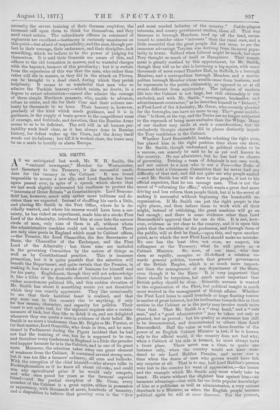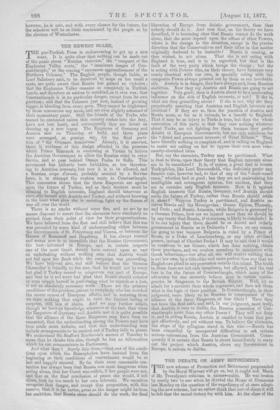MR. SMITH.
AS we anticipated last week, Mr. W. H. Smith, the "eminent newsagent," Member for Westminster, and Secretary to the Treasury, is the successful candi- date for the vacancy in the Cabinet. It was found impossible to secure a new ally, and Lord Bandon has been again passed over, in spite of a speech which shows that we last week slightly underrated his readiness to protect the " interestscof Great Britain" at Constantinople. Lord Beacons- field has, however, acted with rather more boldness and de- cision than we expected. Instead of shuffling his cards a little, and placing Mr. Smith in the Post Office, where he is de- cidedly wanted, and where his success would have been a cer- tainty, he has risked an experiment, made him at a stroke First Lord of the Admiralty, introduced him at once into the narrow circle of men, only nine of them in all, without whom the administrative machine could not be conducted. There are only nine posts in England which must be Cabinet offices, —the Premier, the Lord Chancellor, the five Secretaries of State, the Chancellor of the Exchequer, and the First Lord of the Admiralty ; but those nine are included in the governing Committee by the nature of things as well as by Constitutional practice. This is immense promotion, but it is quite possible that the selection will benefit the Department, and quite certain that the Premier, in making it, has done a good stroke of business for himself and for his party. Englishmen, though they will not acknowledge it, like a little of the dramatic element introduced into their rather monotonous political life, and this sudden elevation of Mr. Smith has about it something scenic yet not theatrical which they can exactly appreciate. They like occasionally to see that their habitual boast is realised, and that any man can in this country rise to anything, if only he has means, character, and capacity for politics. Their boast is not quite real, for the aspirant requires also a certain measure of luck, but they like to think it 90, and are delighted whenever they can quote a ease in evidence of their belief. Mr. Smith is no more a tradesman than Mr. Bright or Mr. Forster, or for that matter, Lord Granville, who deals in ifon, and he men- tioned in Parliament during the Pigott incident that he had not had the training of one, but he is supposed to be one, and therefore every tradesman in England is a little the prouder and happier because he is in the Cabinet, and in one of its great seats. Moreover, the selection takes away one great element of weakness from the Cabinet, It contained several strong men, but it was too like a farmers' ordinary, all corn and bullocks. With the exception of the chief himself—who always talks in Buckinghamshire as if be knew all about oil-cake, and could win any agricultural prize if he would only compete, and who once posed for years as the farmers' especial tri°r"1--and the partial exception of Mr. Cross, every member of the Cabinet is a great squire, either in possession or expectancy, with thousands of acres, hundreds of tenantry, and a disposition to believe that growing corn is the "first and most needed industry of the country." Cattle-plague- interests, and county government excites, them all. That was tiresome to borough Members, bred up off the land, accus- tomed to consider other "interests" than the rural ones, and a little resentful that the great people did not seem to see the immense advantage Toryism was deriving from its novel popu- larity in towns. Salford when Liberal might be meek, but once( Tory thought as much of itself as Hampshire. That resent- ment is greatly soothed by this appointment, for Mr. Smith, though they tell us he also is becoming a big squire, with some thousands of acres round Thurlow Hall, in Suffolk, is a borough Member, and a metropolitan borough Member, and a metro- politan borough Member whose wealth came from business, and he represents to the public citizenship, as opposed to or at all events different from squirearchy. The infusion of modern life into the Cabinet is not large, but still citizenship is not excluded, and with Mr. Smith, "newsagent, bookseller, and advertisement contractor," as he describes himself in " Debrett," as First Lord of the Admiralty, Mr. Goist, who recently pleaded for the boroughs, can have no more to say. The 44 great middle- class" is there, at the top, and the Tories are no longer subjected to the reproach of being more exclusive than the Whigs. Many of our readers may smile at such a consideration, but its exclusively Georgic character did in places distinctly impair the Tory confidence in the Cabinet. Whether Lord Beaconsfield, besides selecting the right man, has placed him in the right position time alone can show, for Mr. Smith, though understood in political circles to be a success, can scarcely be said to be as yet well known to•the country. He can administer, but he has had no chance of governing. Driving a team of Admirals is not easy work, and not easiest to a man who is not a Peer—the Duke of Somerset told a Commons Committee that he never had any difficulty of that sort, and did not quite see why people smiled —and Mr. Smith has still to show to the people, if not to his official superiors, that he can manage men. That is not the secret of "reforming the office," which wants a great deal more driving and less reform than people think, but it is the secret of making it successful without beginning the hundredth re- organisation. If Mr. Smith can put the right people in the right places, and then induce them to work with all their might, instead of criticising, the great machine will go on fast enough ; and there is some evidence other than Lord Beaconsfield's approval that he can do this. It is not, how- ever, evidence as yet clear to the country, and it is upon this point that the attention of the profession, and through them of the public, will at first be flxed,—upon this, and upon another point, as to which the new First Lord should make no mistake. No one has the least idea, not even, we suspect, his colleagues at the Treasury, what he will prove as a. Cabinet Minister. No man, of our time, who has risen so rapidly, occupies so ill-defined a relation to- wards general politics, towards that general government of the British Empire, which is so much more import- ant than the management of any department of the State, even though it be the Navy. It is very important that there should be torpedoes, but much more important that British policy should be clear. Scientific acumen is wanted in the organisation of the Fleet, but political insight is much more wanted in the management of British affairs. Whether the First Lord leans to small ironclads or huge floating towers is matter of great interest, but his inclination towards this or that section in the Cabinet or in the party may involve much more than that. That Mr. Smith is a "clear head," and a "safe man," and a "good administrator" may be taken not only as granted, but as proved ; 'but his quality as statesman has still to be demonstrated, and demonstrated to others than Lord Beaconsfield. Half the value as. well as three-fourths of the power of an English Cabinet Minister is lost, if he is known only to the official world, if the country does not feel why, when a Cabinet of his side is formed, he must always have a front place. There never was a time, to quote one instance only, when the country would not have won- dered to see Lord Halifax Premier, and never was a time when the dozen of men who govern would have felt any surprise at all. That is to say, half Lord Halifax's powers were lost to the country for want of appreciation,—the lesson and the example which Mr. Smith may most wisely take to heart. He starts without the slightest bias against him—an immense advantage—but with far too little popular knowledge of him as a politician as well as administrator, a very serious drawback to a Minister, as when the English people become political again he will at once discover. For the present, however, he is safe, and with every chance for the future, for the selection will be as little condemned by the people as by the electors of Westminster.































 Previous page
Previous page